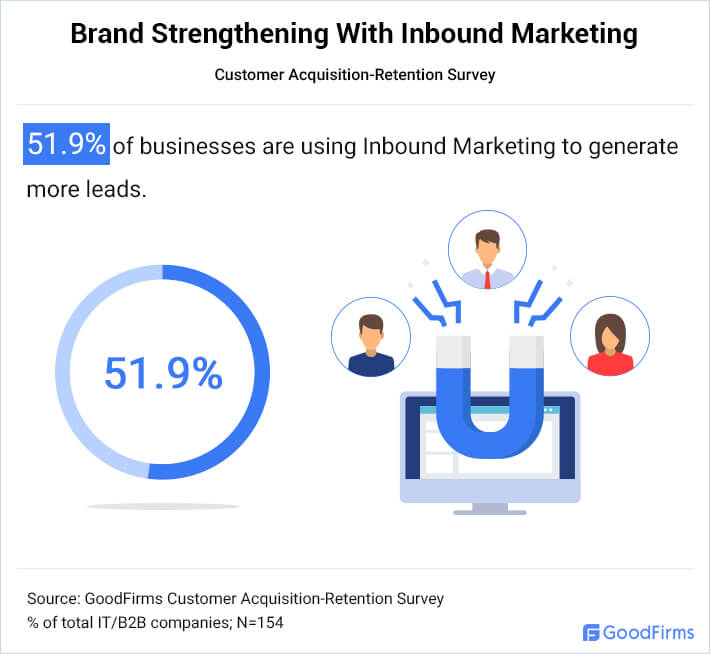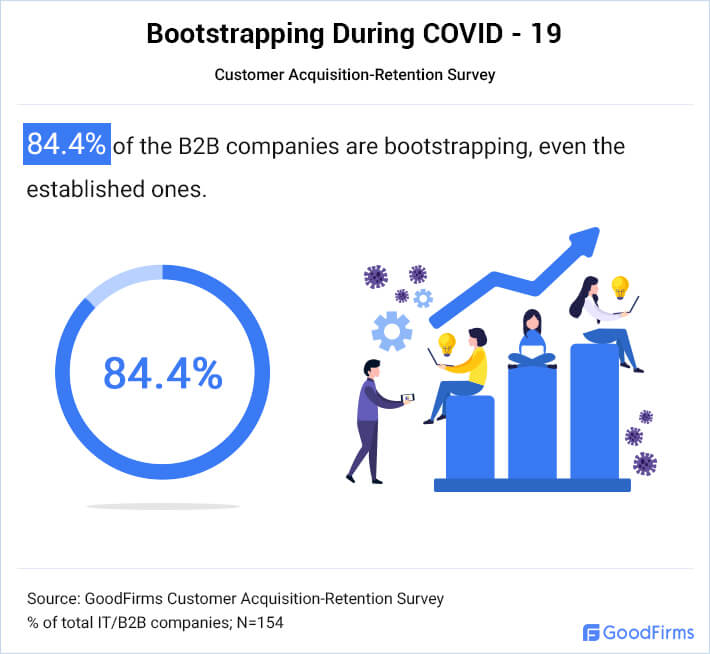The unfolding of the Covid-19 crisis has induced mass isolation and widespread closures worldwide, impacting businesses across all sectors to an unprecedented degree. Despite these challenging circumstances, IT entrepreneurs have been putting a great deal of effort into customer acquisition and customer retention. This Goodfirms study delves deeper into the hows and whys of such business endeavors.
Customer acquisition is a process that requires forethought and strategies evolving with time to bring in new users. Customer retention starts the moment a customer has the first contact with a company and continues throughout the lifetime of the relationship. While many businesses and individuals are under the threat of financial fall, IT companies and B2B firms can turn, and are turning, the tables with some discretion and efforts in the right direction.
Goodfirms surveyed 150+ leading IT/B2B companies across the globe to find out the difficulties they are facing for acquiring new customers and retaining old ones due to the pandemic, as well as the strategies they've devised to brave these challenges and keep the ball rolling.
Customer Acquisition is Still Relevant During Pandemic
The coronavirus has spread fear among customers and businesses alike by disrupting the supply chain and hitting almost every sector. But the IT industry is quite resilient to soften the blow and thrive in altered circumstances. An astonishing 97.4% of the surveyed IT companies still consider customer acquisition relevant during COVID-19.
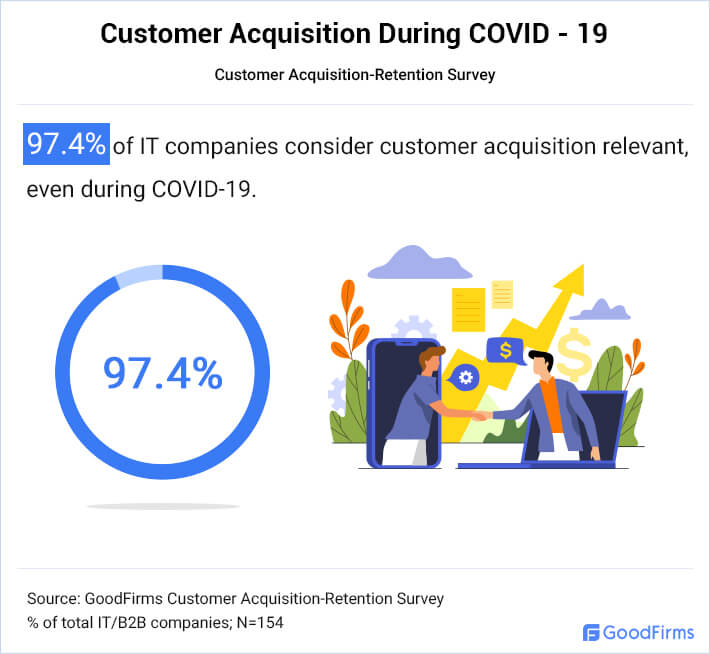
Irrespective of its size or age, almost every digital company is systematically attempting to attract new customers to make ends meet, pay employees, and, ultimately, have a healthy and growing business.
"The 2008 recession showed us that cutting client acquisition programs during a time of economic downturn is the fastest way to nosedive a company", says Alexander M. Kehoe, Co-founder & Operations Director at Caveni. He believes that client acquisition is the lifeblood of any business.
Alexander explains, "When it comes to any lead generation, there is always a cost in either time, money, or both. Normally, this cost is justified by huge ROIs for every campaign. When spending, in general, becomes more sedated, that same ROI will undoubtedly begin to shirk. The margins may become lower, but in most cases, client acquisition does pay dividends."
IT companies have accepted that they might not possibly see the results of client acquisition at once, but eventually, margins will return to the same level as pre-pandemic. And so, they focus on short sprints keeping long term commitments on the back burner for now.
Also, timing plays a huge role when it comes to making business decisions. Ankit Singh, Founder & Chief Operating Officer at techugo, says, "If at the right time you make the right investment, results can be astonishing. Now waiting for coronavirus to leave our planet, or waiting for scientists to develop a vaccine is a time-consuming process. With extra caution and effort, businesses can get their process back on track and boost their client acquisition and elevate the team's morale."
Not everyone is attempting to increase client acquisition, though. Zarrar Chishti, CEO at Tentacle Solutions Limited, is one from the miniscule fragment of companies who have adopted a wait-n-watch approach. He reasons, "First of all, decision-makers in our target audience are not at their desks right now, literally and figuratively. This fact alone would render any efforts useless since our message would not be reaching the intended recipients, and even if it does - they are not ready to hear it. Secondly, despite all the zooming and video-conferencing, physically, those decision-makers are not with their teams."
Need for Digital Transformation Has Fueled Businesses for IT Companies
The IT industry has been thriving for decades now, but never before has it witnessed such a growing need for digital transformation. The reason is that businesses are determined to outmaneuver corona-induced uncertainty. Hence, they aim to build the competencies - to be more digital, data-driven, have agile operations, and automation. 78.6% of the surveyed IT companies admit that they've seen a window of opportunity opening with the perceptible increase in the demand for digitization.
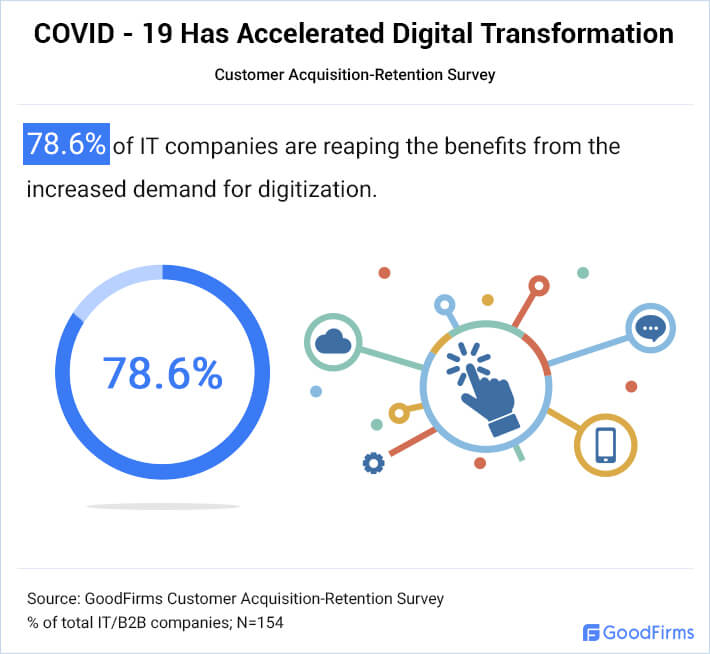
"From our perspective as an IT software vendor," says Peter Dougherty, CEO of MantisNet, "for enterprise organizations, we find that operating a business during the pandemic likely uncovered new challenges that the business didn't realize."
Peter has seen a reduction in sales meetings at the onset of the pandemic shut-down and people working from home. But, as it happens, this brought new business opportunities for the IT sector.
Peter explains, "People need improved uptime and speed of processing, and accelerating move to the cloud for scale and edge access. Once IT may have prioritized LAN (local area network) performance and optimization, now, the move to manage remote employees and client interactions likely require different setups. Such as a need for WAN (wide area network), improved identity and access management (IAM) to ensure its authenticated employees are accessing the corporate network and validating their access."
Many talented people are re-examining their options for entrepreneurship, and going digital has become almost mandatory to stay functioning during the crisis.
Clara Buenconsejo, Digital Marketing Consultant at The Clay Media, expresses that as a lot of people stay indoors because of social distancing, many brick-and-mortar stores are exploring ways to do business online. She says, "That's where IT companies step in - whether it's a business looking to get a new website, or needing help setting up ads on Google or Facebook; many small businesses will need help from tech-savvy individuals to pivot to ecommerce."
On the other hand, the corona-triggered massive spike in uncertainty and the volatility in the global business environment/stock market have compelled many customers to drive down the costs. "As many customers face a cash crunch, organizations are reevaluating their budgets amid COVID," says Peter Jackson, CEO at Bluescape. They also have ramped up the efforts to both retain clients and grow their business.
Peter further adds, "Nowadays, it has been critical to not only position our company as a necessity but as an essential tool for long-term growth and success. Since it looks like COVID-19 will impact our lives deep into 2021, businesses will need to look at how they can keep their contacts as Q4 rapidly approaches, and budgets are reevaluated even further."
IT Businesses Opt For Brand Strengthening With Inbound Marketing
The majority of marketers do not want to miss out on millions of prospects, so they consider leveraging social media platforms as a non-negotiable strategy to acquire new customers. More than half of the surveyed marketing experts are utilizing inbound marketing as a guaranteed way to increase the brand's exposure, engage the prospects in a more personalized manner, and generate more leads.
Therefore, Hiral Atha, CEO at Moveo Apps, says, "We refocused our digital presence to reach out to the large numbers of people who are stuck in quarantine and spend more time on the internet. We offered free online consultations on our website, doubled down on our social media marketing efforts, and became increasingly active on LinkedIn and Facebook. At the same time, our B2B partners kept the wheels moving in the background to ensure a steady inflow of new clients."
The businesses are taking the help of SEO services to target a more precise audience, based on the keywords they use. And as SEO goes hand-in-hand with content marketing, companies focus on valuable content creation to let the prospects learn more about their business.
Michael Alexis, CEO of TeamBuilding, a B2B company that provides team-building services to other companies, says, "With COVID, our live experience business went to essentially zero. However, with that drop also came an opportunity to offer virtual team building instead. We've been using content marketing to reach an audience with new questions they are trying to find answers to. For example, "how do you engage a remote team?" or "what are some games I can play on Zoom?" With these efforts, we've been able to bring back many of our employees and give them meaningful work."
Because there's no one-size-fits-all internet marketing channel, businesses do not opt to use each of them. "You do not need to be on all social media platforms, but make sure you are active on the ones where you are," says Paige Arnof-Fenn, Founder & CEO of Mavens & Moguls.
She explains, "More than Rolodex or an online resume, LinkedIn is now considered the foundation for building trusted relationships in the digital economy. You need to prioritize the platforms where your customers are maximum active, whether it is Facebook, Twitter, or Instagram. For businesses such as mine, LinkedIn matters the most. These ideas do not require big budgets, but they are productive ways to stay connected during the crisis."
Even Well-Established Companies are Bootstrapping Their Businesses
The already established businesses also find it challenging to keep their financial wheels turning owing to the general unpredictability in the global environment. Rather than ending up without the resources, 84.4% of the surveyed companies are taking measured approaches to hold onto their cash reserves and reduce financial and operational exposure.
"Even if you did nothing wrong and your customers are 100% loyal, you may still see a good chunk of your business vanish," says Ksenia Larina, Head of Content at Lemon.io. She acknowledges various B2B companies struggling because of the spiking churn rates.
Still, showing the optimism, Ksenia says, "But that doesn't mean you should accept your fate and go down without fighting. Every crisis is also an opportunity. We've shifted our focus a little towards projects we can implement in short sprints, which give us the most exposure and require next to zero investments in cash. It's also a good time to unholster your creativity and think of ways to pick up the clients who left your competitors looking for better deals."
Companies are refreshing their resilience planning strategies to fight against the severity of the H1N1 pandemic. "Many businesses have had to make drastic cuts to their operations and are moving forward on very tight budgets," says Sara Lane, Digital Marketing Manager at SimplePin. She believes that, generally, tech investment is needed to operate more efficiently. But if potential clients don't even know the businesses' names, then they may miss out on the chance to make that improvement when it's desperately needed.
Sara advises, "The sales cycle and onboarding process are mostly extended. Now, it's important to look for those clients that you can truly offer support to make their budgets stretch further, and their operations run more smoothly."
With bootstrapping, businesses can survive by aligning the customer's capacity and demand with their ROI and stabilize their revenues. Dancho Dimkov, Founder and CEO of BizzBee Solutions, says, "Our approach has shifted since the coronavirus crisis. Our solution was growth-oriented - an opportunity for B2B companies to grow their business. Now, we offer the same solution, but more as survival-oriented - B2B companies need to acquire new clients to survive, not to grow."
Special COVID - 19 Waivers to Rescue IT Customers From Cash Burn
The ongoing COVID-19 pandemic has made people grab up every little opportunity that does not break their shrinking budget and keep their businesses on track. The magnitude and speed of the shift have affected the SMBs the most. Fortunately, more than 1/3rd of business owners understand the need to offer relief measures to prop up their customers, which have been hit hard.
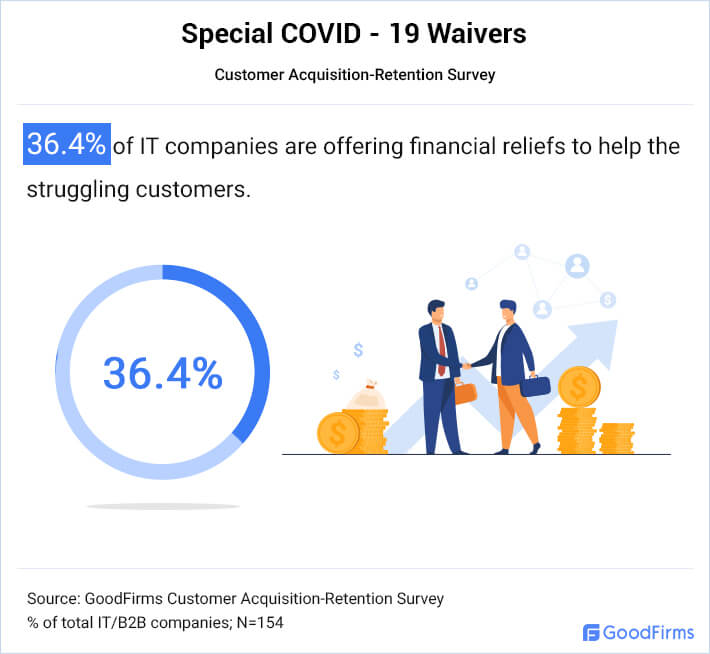
Plenty of business software and services companies are rolling out various free products/services, free customer upgrades to more advanced tools, software design tools, web conferencing, education, training, to help their customers cope with the consequences of the recession.
HubSpot was among the pioneers for extending a generous offer to the SMB market. They have suspended marketing email send limits for marketing hub professionals and enterprise customers. Also, they've increased limits on calling to 2,000 minutes/month for starter and professional customers of Sales Hub and Service Hub. HubSpot has reduced its Starter Growth Suite from $112.50/month to $50/month to support small businesses through this uncertain time.
Adobe made its web conferencing service, Adobe Connect, free for 90 days to individuals, businesses(with up to 25 participants), who weren’t their customers if they signed up for a trial license between March and July 1st. The company also offers its support to customers who want to expand their current licenses because of a higher workload these days.
The companies that have given their open-source software away regularly are stepping up their assistance during these difficult times. Various organizations dealing in Graph Analytics, Machine Learning, Mapping Tools, Data Education, Cloud Computing, IT Service Desk, and Messaging Healthcare Analytics, are giving waivers on their software or services.
"We are reevaluating processes together and see if we can create efficiencies or cut costs in various places during this time," says Nancy Sabino, CEO and Co-Founder of SabinoCompTech.
Further giving insight about other ways businesses can help their customers, she says, "We've started to talk about PPP loans, make connections with bankers and CPAs, and provide resources. We've also talked about strategy in terms of what other sectors or vertical markets they can enter, and how we can help accomplish that with technology."
They Are Even Offering Value-Added Services For Free
Businesses know that they can withstand these unusual times by acknowledging their customers' financial issues and providing solutions. So, 46.8% of the surveyed companies offer value-added services for free to struggling customers who want access to certain features, software options, services, etc.
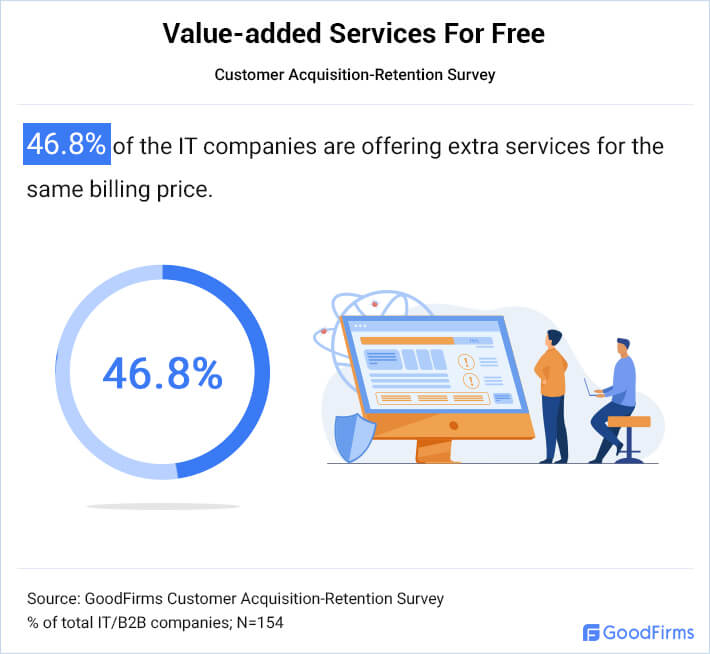
Ahrefs, which is widely known for its website analysis tool sets, can also boast of having a strong academy. They are now offering people willing to embrace an intelligent inbound marketing strategy, "Blogging for Business" course for free, which used to cost $799.
Microsoft had made Teams - an enterprise platform that combines chat, notes, attachments, and meetings in a single workspace - available for everyone, including individuals and IT professionals who needed to roll out Teams in their companies. The offer was open for six months, starting from March 5, 2020.
People certainly need the opportunity to proactively and affordably manage their finances for the long term. Flexibility in payment options, coupled with some value-added services, is helping companies attract and retain customers.
Alex Chamberlain, Marketing Manager at ERA Environmental Management Solutions, says, "We introduced some more flexible payment options for struggling clients. We also have developed some value-added apps to our SaaS platform that are specific to assisting with COVID relief and pandemic response tracking. They're free to clients and help address some of their new challenges – we're seeing this is helping them re-invest psychologically in the program."
This exceptional situation demands extraordinary measures. Knowing what your clients need the most certainly pays off. Aqsa Tabassam, Brand Manager at SimplFulfillment, who has put costs down and added valuable features to retain the customers, informs, "We have approached companies' representatives and convinced them to take these services at low costs. Additionally, we have surveyed our clients to shortlist their top concerns in a pandemic. We have added functionalities in our software that could put off their load and help them handle things effectively."
Companies are working hard despite the difficult circumstances and have taken to introspecting about the overall improvements. "We are asking ourselves what value should we provide so that they see sense in continuing the relationship while cutting costs elsewhere." says Brad Fagan, Content Marketing Manager at Wunderbar Marketing & SEO Solutions.
He further adds, "We try to make sure that we offer free projects during this time that we believe will increase online engagement or work more hours to justify the cost. It definitely puts a strain on us, but that's what it takes to retain clients at the moment."
Webinars Are Playing A Significant Role In Engaging Customers
During the lockdown, 62.3% of the surveyed entrepreneurs have increased using webinars as one of the most effective and inexpensive channels to take offline events online. By having real-time engagement with an audience in a contactless world, B2B companies are promoting their businesses directly to several organizations at the same time.
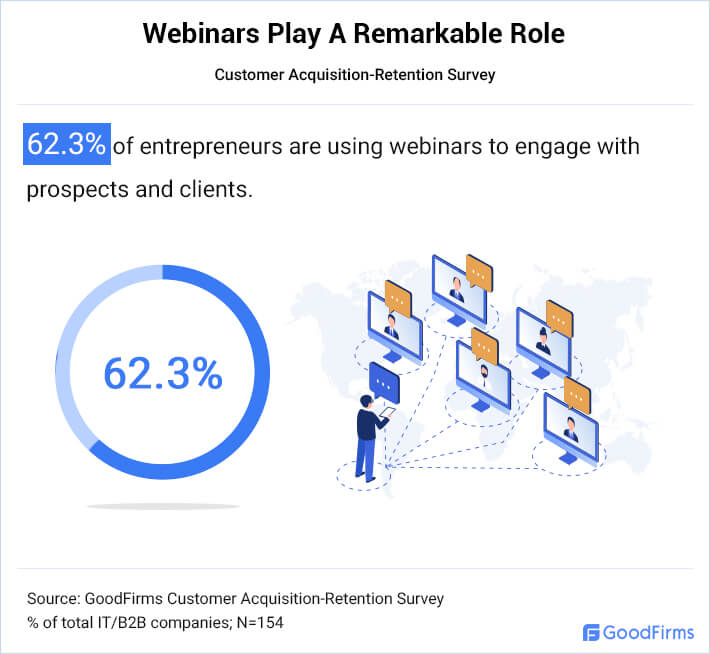
Amra Beganovich, CEO/Founder of A&E, says, "We are trying to get creative by utilizing technology for improving our deliverability. We are hosting virtual events - zoom discussion panels with speakers, etc. And we ensure to make them available for attendance to even a greater number of viewers."
With the interactive nature of webinars, businesses can showcase problems, kill objections, and effectively address the challenges of distant working.
Peter Jackson works tirelessly to adapt their solutions to the gaps and pain points that remote work creates. He says, "To keep relationships close, we host webinars to show business leaders how they can lead effectively and adapt their skills to be productive from their homes and other skills to relieve their remote work pain points."
Businesses use webinars for various purposes, such as onboarding customers, displaying leadership in the industry, launching new products/services, and many more. Various webinar tools available in the market help them deliver live high-quality video and provide features like polls, live-chat, built-in surveys, automated webinar sequences, live-streaming, and more.
As someone providing webinar software, Filip Starej, Project and Communications Manager at CoreEvent, says, "The challenge for us is obvious - we are an event management software, and the events are, well, gone (mostly). So, we started pitching our software as a webinar organization tool and helped some of our clients for the transition to virtual events."
Moreover, Virtual Meetings Are Now An Intrinsic Part Of Remote Work Culture
People are growing accustomed to remote interactions and work-from-home practices. Many of the IT companies have planned to adhere to the remote working model until the pandemic ends, and so, virtual meetings have truly become indispensable. Spending more time on Zoom and Skype calls since last few months, Paige says,
"I've found that if small groups in our team want to talk through any specific issues, such as managing anxiety, kids, parents, etc., virtual coffee meetings online have been helpful. A few colleagues even meet online after work for virtual happy hour/beer/cocktails when they have more time to chat. We certainly believe that finding routines and things we can control will help."
Companies Are Keeping Their Clients In Loop More Than Ever
Since long, not a single event has caused this level of economic turmoil globally and forced businesses to rethink their procedures and strategies. Companies and customers have realized that everything they relied on has been shaken to the core. So, to brave the times when social distancing has almost eliminated personal interaction, a whopping number of the surveyed companies - 87% of them are working diligently to communicate frequently and strengthening relationships with consumers.
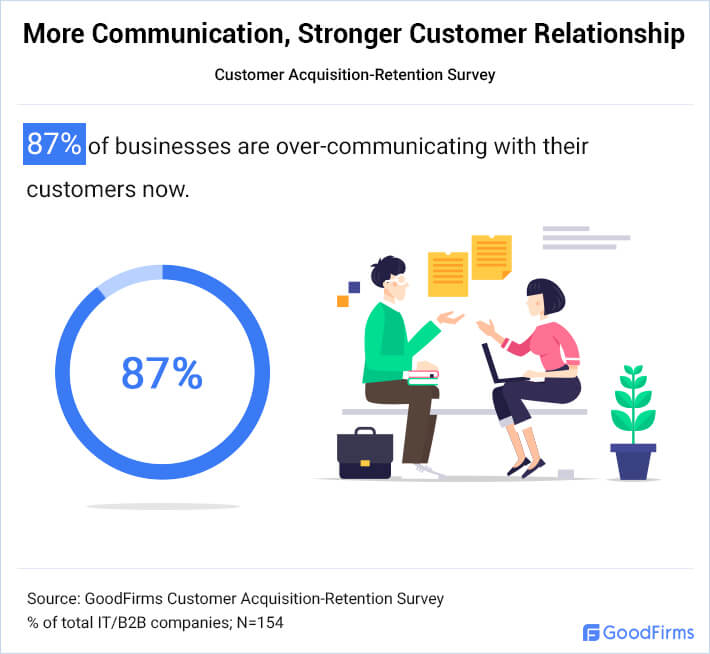
"People are looking for guidance and want to be communicated with, to know what's going on. Our customers are no different," says Manny Hernandez, Founder/CEO of OMNI, INC. They also allow clients to provide feedback.
Manny says, "The global uncertainty seems to be the most challenging, but we have managed to proactively keep our customers informed on what we are doing during this uncertain time. Our company's values, new strategies, modifications - every new change is being communicated. Keeping open communication channels with clients is now important, more than ever."
Customers always appreciate getting updates from the company, whether it is the assurance about the continuation of the services or the announcement of a 'temporary closure plan.' Rohit Sahay, Co-Founder of Easy Resume, believes that even if customers are likely to churn, one can still take advantage of their relationship by being a helpful voice during a difficult time.
He says, "Luckily, your pathway is even easier now that you've already established a prior relationship with them. By staying on top of mind and advising through an email, SMS, or other marketing channels - you'll always be a familiar voice and, hopefully, be the first choice when they're ready to get back on their feet."
Lack of communication breeds doubt and uncertainty. It might offend the customers, and one may lose them to their competitors. After being in that situation once, Branka Vuleta, Founder of LegalJobSite, has increased their clients' communication and made sure to be a stable, reliable partner in these tumultuous times.
She says, "After one client pulled out, we've made a quick plan and strategy for approaching our clients before they come to us. We have made a special, discounted price for our services and offered to take delayed payments so that our clients can wrap their heads around the situation and weather the storm in their time."
Strategies to Acquire and Retain Customers
IT/B2B companies understand that retaining current customers is as necessary as acquiring new ones. Here are some tangible strategies to increase customer acquisition and retention.
1. The Rise In The Demand Of Distance Education Presents Opportunity
Though there already was high growth and adoption in distance education technology, the world has seen quite rapid and a bit unplanned surge in demand for online learning.
Offering a product and solution that help offset some of the challenges created by the COVID crisis, Doug Donovan, CEO at Interplay Learning, informs, "In fact, the demand for our distance learning product has actually increased considerably over the last 4 months. The crisis has worked as a catalyst for many who had been considering using online technical training to take action. In times of crisis, rapid up-skilling, re-skilling, and access to distance education have never been more imperative."
2. Be At The Center Of The Focus By Establishing Business As A Thought Leader
Bryan Cockerham, Partner & CTO at Punchmark, believes that people quickly look for a leader during uncertain times, especially in complicated industries like IT, where not everyone knows the answers. He says, "Establishing your business as a thought-leader and a fountain of knowledge during a crisis puts you at the center of focus where you can explain how your services help companies weather the storm. We started by finding key businesses in the industry who had answers and positive outlooks -- businesses who were adapting quickly to the changing times. We created a podcast called the "Jewelers' Survival Kit," and armed with the collective popularity of ourselves and the key people; we attracted a lot of attention-getting hundreds of downloads per episode in a small industry."
He further adds, "We also conducted the industry's first successful virtual conference called the Couch Conference. We filled it with short, 25-minute sessions of useful information by industry leaders, and had 850 attendees. Our competition did not act as fast, nor as drastically with key industry leaders, and a lot of their clients moved to us as a result."
3. Viewing Marketing Spend As An Investment That Positions You Ahead Of Competitors
Chintan Shah, President and Managing Partner at KNB Communications, says, "The smart play is to identify unique areas for your product or service and view marketing spend as an investment that positions you ahead of competitors in the future. At KNB Communications, we have refreshed our account-based marketing strategy. We have also stepped up our paid search campaign to ensure that we are capturing those prospects who are actively looking for a B2B marketing and PR agency."
4. Switching From Strategic Long-term Objectives To A Much More Tactical View
Roman Chernyshev, Managing Director at DataArt, says, "We've increased the number of touchpoints with the clients wherever possible, as we are trying to stay on top of events in a quickly changing environment. With a lot of clients, we have switched from long-term strategic objectives to a much more tactical view, focused on an immediate response to challenges they are facing because of COVID-19. We also had to change our resource management and recruiting approaches to keep our own operations closer to an optimal flow."
Conclusion
The majority of IT and B2B companies declare that even though their efforts might not yield visible results shortly, they will leave no stone unturned to increase client acquisition and retention. Conducting virtual meetings, holding webinars, and having consistent communication with customers have intervened in the lives of professionals.
Businesses prefer to build brands with social media marketing. Covid-19 has severe consequences on the global economy, And so to retain customers, companies are adopting bootstrapping, offering discounts, and adding free services. One positive outcome, though - because of the shift in the businesses' functioning, every industry has identified the need for digital transformation, sending more work in the direction of IT companies!
IT services can assist businesses in 'immediate response services' (cash liquidity management, communication management, etc.) and 'long term services' (digitization, business continuation planning, etc.) The Goodfirms list of the top ones will help you locate the most appropriate firm.
Table of contents
- Customer Acquisition is Still Relevant During Pandemic
- Need for Digital Transformation Has Fueled Businesses for IT Companies
- IT Businesses Opt For Brand Strengthening With Inbound Marketing
- Even Well-Established Companies are Bootstrapping Their Businesses
- Special COVID - 19 Waivers to Rescue IT Customers From Cash Burn
- They Are Even Offering Value-Added Services For Free
- Webinars Are Playing A Significant Role In Engaging Customers
- Companies Are Keeping Their Clients In Loop More Than Ever
- Strategies to Acquire and Retain Customers
- Conclusion
